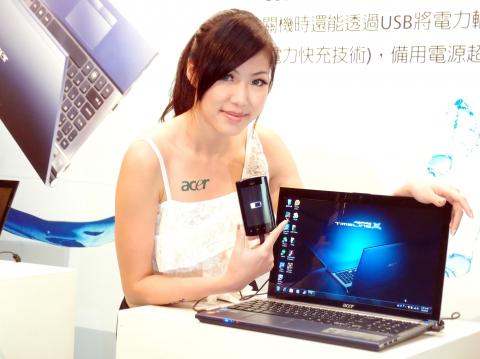PC brand Acer Inc (宏碁) yesterday said it would likely raise prices for laptop computers in the second half of the year if a squeeze on component supplies from Japanese manufacturers continues.
Current inventories of -Japanese-made components could last until the end of next month, Acer president for Taiwan operations Scott Lin (林顯郎) told reporters on the sidelines of a product launch.
Acer possesses a month’s supply of notebooks and retailers such as Tsann Kuen Enterprise Co (燦坤實業) have another month’s supply. Contract manufacturers such as Compal Electronics Inc (仁寶) and Quanta Computer Inc (廣達) have two to three more weeks of stock, which means Acer’s inventory would last until about the end of next month, he said.

Photo: Chen Ping-hung, Taipei Times
With stocks expected to run low in June, a price rise is possible because of a shortage in components from Japanese manufacturers, which are still reeling from the effects of the March 11 earthquake and tsunami.
Even though some Japanese facilities have resumed production to a certain extent, they might not be able to fully cope with demand, Lin said.
In anticipation of a possible price adjustment, consumers at a computer fair in Kaohsiung snapped up the latest Acer notebooks from last Thursday to Monday, causing a three-fold rise in the company’s sales, he said. Another company fair commences in Taipei today at the Taipei World Trade Center’s Hall 1 and ends on Monday.
Acer is also upbeat on sales of its first tablet device — Iconia Tab — launched last week in Taiwan. The company has sold 1,000 tablets so far and a telecoms operator has placed an order for 4,000 units, Lin said.
“The tablet war has begun. It isn’t Acer’s and Asustek Computer’s (華碩) battle against Apple. It’s the Google-led camp confronting Apple,” Lin said.
He acknowledged Apple’s dominance in the tablet market, but said other makers stood a chance of seizing market share by using Google Inc’s Android platform.
“The more you limit the users, the more problems will arise,” the Acer president said.
The so-called open platform means that Acer tablets offer USB ports for users to share files, as well as Flash support for Web page views — features missing from Apple’s iPad, Lin said.

Nvidia Corp’s demand for advanced packaging from Taiwan Semiconductor Manufacturing Co (TSMC, 台積電) remains strong though the kind of technology it needs is changing, Nvidia CEO Jensen Huang (黃仁勳) said yesterday, after he was asked whether the company was cutting orders. Nvidia’s most advanced artificial intelligence (AI) chip, Blackwell, consists of multiple chips glued together using a complex chip-on-wafer-on-substrate (CoWoS) advanced packaging technology offered by TSMC, Nvidia’s main contract chipmaker. “As we move into Blackwell, we will use largely CoWoS-L. Of course, we’re still manufacturing Hopper, and Hopper will use CowoS-S. We will also transition the CoWoS-S capacity to CoWos-L,” Huang said

Nvidia Corp CEO Jensen Huang (黃仁勳) is expected to miss the inauguration of US president-elect Donald Trump on Monday, bucking a trend among high-profile US technology leaders. Huang is visiting East Asia this week, as he typically does around the time of the Lunar New Year, a person familiar with the situation said. He has never previously attended a US presidential inauguration, said the person, who asked not to be identified, because the plans have not been announced. That makes Nvidia an exception among the most valuable technology companies, most of which are sending cofounders or CEOs to the event. That includes

INDUSTRY LEADER: TSMC aims to continue outperforming the industry’s growth and makes 2025 another strong growth year, chairman and CEO C.C. Wei says Taiwan Semiconductor Manufacturing Co (TSMC, 台積電), a major chip supplier to Nvidia Corp and Apple Inc, yesterday said it aims to grow revenue by about 25 percent this year, driven by robust demand for artificial intelligence (AI) chips. That means TSMC would continue to outpace the foundry industry’s 10 percent annual growth this year based on the chipmaker’s estimate. The chipmaker expects revenue from AI-related chips to double this year, extending a three-fold increase last year. The growth would quicken over the next five years at a compound annual growth rate of 45 percent, fueled by strong demand for the high-performance computing

TARIFF TRADE-OFF: Machinery exports to China dropped after Beijing ended its tariff reductions in June, while potential new tariffs fueled ‘front-loaded’ orders to the US The nation’s machinery exports to the US amounted to US$7.19 billion last year, surpassing the US$6.86 billion to China to become the largest export destination for the local machinery industry, the Taiwan Association of Machinery Industry (TAMI, 台灣機械公會) said in a report on Jan. 10. It came as some manufacturers brought forward or “front-loaded” US-bound shipments as required by customers ahead of potential tariffs imposed by the new US administration, the association said. During his campaign, US president-elect Donald Trump threatened tariffs of as high as 60 percent on Chinese goods and 10 percent to 20 percent on imports from other countries.